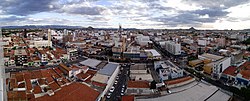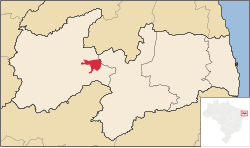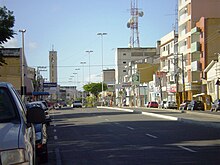Patos is a municipality of the state of Paraíba in the Northeast Region of Brazil. It is classified by the Brazilian Institute of Geography and Statistics as a sub-regional center A.[1][2]
Patos | |
|---|---|
 Panorama view of the city of Patos, state of Paraíba, Brazil | |
| Motto: "Sun's residence" | |
 Location of Patos in Paraíba | |
| Coordinates: 7°01′28″S 37°16′48″W / 7.02444°S 37.28000°W | |
| Country | |
| Region | Northeast |
| State | Paraíba |
| Mesoregion | Sertão Paraibano |
| Government | |
| • Mayor | Nabor Wanderley da Nóbrega Filho[6] (Republicanos, 2021 – 2024) |
| Area | |
| • Total | 513 km2 (198 sq mi) |
| Elevation | 242 m (794 ft) |
| Population (2021) | |
| • Total | 108,766 |
| Time zone | UTC−3 (BRT) |
| Website | www.patos.pb.gov.br (in Portuguese) |
It is located in the Espinharas River valley, surrounded by the Borborema Plateau to east and south, and by the pediplain Sertanejo to the west. It originated from the village of Patos, spun off from the Parish of Nossa Senhora do Bom Sucesso de Pombal on October 6, 1788.[3]
The city is 306 km from the city of João Pessoa, the center of its immediate and intermediate geographic regions. It stands out as an educational, commercial, banking, religious and health center, both in the back country of Paraíba, and in areas of Pernambuco and Rio Grande do Norte.[4] It is the third most important municipality in the state considering the economic, political and social aspects (behind João Pessoa and Campina Grande).[5] According to IBGE estimates for 2021, it is the fourth most populous municipality in the state with 108,766 inhabitants. [6]
Esporte and Nacional are the city's two football (soccer) clubs. They play at the José Cavalcanti Municipal Stadium. There are four multisport arenas: Rivaldão, AABB, SESC and SESI.
The city is served by Brig. Firmino Ayres Airport.

Climate
editThe city of Patos experiences a tropical hot semi-arid climate (Köppen: BSh), just short of a tropical savanna climate, with a short rainy season from February to April. During this period, when the equatorial rainband associated with the highly seasonalized positioning of the Intertropical Convergence Zone is over the city, warm to hot temperatures and abundant equatorial rainfall prevail. Conversely, the dry season dominates the remaining majority of the year, with abundant sunshine prevalent from May to January. The wettest month is March, with an average monthly precipitation of 213 mm (8.38 in), while the driest month is September, with an average precipitation of only 1 mm (0.04 in).
| Climate data for Patos (1981–2010) | |||||||||||||
|---|---|---|---|---|---|---|---|---|---|---|---|---|---|
| Month | Jan | Feb | Mar | Apr | May | Jun | Jul | Aug | Sep | Oct | Nov | Dec | Year |
| Record high °C (°F) | 39.1 (102.4) |
38.9 (102.0) |
39.6 (103.3) |
38.5 (101.3) |
38.0 (100.4) |
37.0 (98.6) |
36.5 (97.7) |
38.6 (101.5) |
38.5 (101.3) |
39.8 (103.6) |
39.5 (103.1) |
39.5 (103.1) |
39.8 (103.6) |
| Mean daily maximum °C (°F) | 34.9 (94.8) |
34.3 (93.7) |
33.6 (92.5) |
33.1 (91.6) |
32.7 (90.9) |
32.1 (89.8) |
32.3 (90.1) |
33.2 (91.8) |
34.8 (94.6) |
35.9 (96.6) |
36.2 (97.2) |
36.0 (96.8) |
34.1 (93.4) |
| Daily mean °C (°F) | 28.5 (83.3) |
27.9 (82.2) |
27.4 (81.3) |
27.2 (81.0) |
26.9 (80.4) |
26.2 (79.2) |
26.0 (78.8) |
26.5 (79.7) |
27.5 (81.5) |
28.5 (83.3) |
29.1 (84.4) |
29.2 (84.6) |
27.6 (81.7) |
| Mean daily minimum °C (°F) | 22.9 (73.2) |
22.7 (72.9) |
22.4 (72.3) |
22.4 (72.3) |
22.0 (71.6) |
21.3 (70.3) |
20.6 (69.1) |
20.6 (69.1) |
21.3 (70.3) |
22.0 (71.6) |
22.6 (72.7) |
23.0 (73.4) |
22.0 (71.6) |
| Record low °C (°F) | 18.5 (65.3) |
20.0 (68.0) |
19.9 (67.8) |
19.5 (67.1) |
17.8 (64.0) |
16.2 (61.2) |
15.7 (60.3) |
16.1 (61.0) |
18.0 (64.4) |
19.1 (66.4) |
20.0 (68.0) |
18.7 (65.7) |
15.7 (60.3) |
| Average precipitation mm (inches) | 115.7 (4.56) |
127.5 (5.02) |
209.5 (8.25) |
127.4 (5.02) |
81.6 (3.21) |
28.7 (1.13) |
9.8 (0.39) |
7.8 (0.31) |
1.3 (0.05) |
7.2 (0.28) |
7.1 (0.28) |
40.8 (1.61) |
764.4 (30.09) |
| Average precipitation days (≥ 1.0 mm) | 7 | 8 | 13 | 9 | 6 | 3 | 2 | 1 | 0 | 1 | 1 | 2 | 53 |
| Average relative humidity (%) | 58.5 | 63.0 | 68.7 | 70.1 | 65.3 | 61.7 | 57.7 | 53.9 | 49.6 | 48.2 | 48.8 | 51.3 | 58.1 |
| Mean monthly sunshine hours | 260.6 | 225.7 | 257.7 | 251.1 | 244.3 | 223.5 | 238.9 | 271.4 | 290.7 | 306.1 | 293.7 | 286.0 | 3,149.7 |
| Source: Instituto Nacional de Meteorologia (temperature records: 1975 to 1984 and 1993 to 2013)[7][8][9] | |||||||||||||
See also
editReferences
edit- ^ "Regions of Influence of Cities 2007" (PDF). Brazilian Institute of Geography and Statistics (IBGE). October 10, 2008. Retrieved April 3, 2017.
- ^ "Configuration of the Urban Network of Brazil" (PDF). Brazilian Institute of Geography and Statistics (IBGE). June 2001. Retrieved December 3, 2020.
- ^ "History - Patos-PB" (PDF). Brazilian Institute of Geography and Statistics (IBGE). Retrieved June 20, 2019.
- ^ Sinatran-PB. "CITIZEN SUGGESTION: Integration Terminal of buses and Alternatives in Patos". Retrieved September 20, 2013.
- ^ "Patos or Santa Rita? What is the third most important municipality in Paraíba?". Folha Patoense. September 2, 2019. Retrieved September 4, 2019.
- ^ "Estimativa populacional 2021 IBGE". Instituto Brasileiro de Geografia e Estatística (IBGE). August 28, 2021. Retrieved August 28, 2021.
- ^ "Normais Climatológicas Do Brasil 1981–2010" (in Portuguese). Instituto Nacional de Meteorologia. Retrieved 21 May 2024.
- ^ "Série Histórica - Dados Diários - Temperatura Mínima (°C) - Patos". Banco de Dados Meteorológicos para Ensino e Pesquisa. Instituto Nacional de Meteorologia. Retrieved 30 May 2014.
- ^ "BDMEP - Série Histórica - Dados Diários - Temperatura Máxima (°C) - Patos". Banco de Dados Meteorológicos para Ensino e Pesquisa. Instituto Nacional de Meteorologia. Retrieved 30 May 2014.
External links
edit- Media related to Patos (Paraíba) at Wikimedia Commons
- CPRM – Serviço Geológico do Brasil
- Prefeitura Municipal de Patos
- FAMUP


